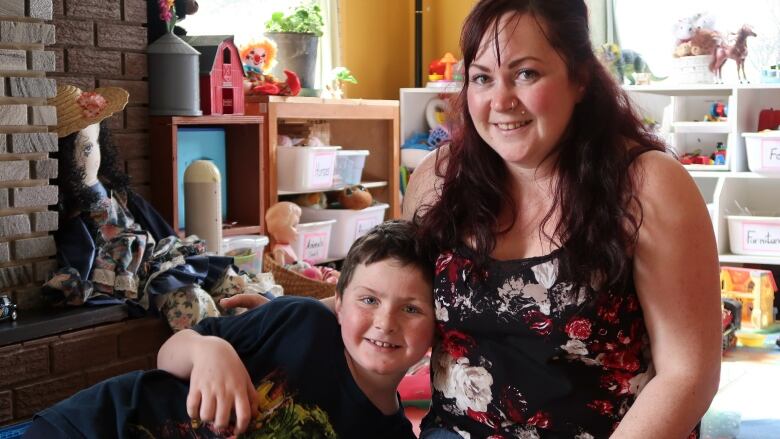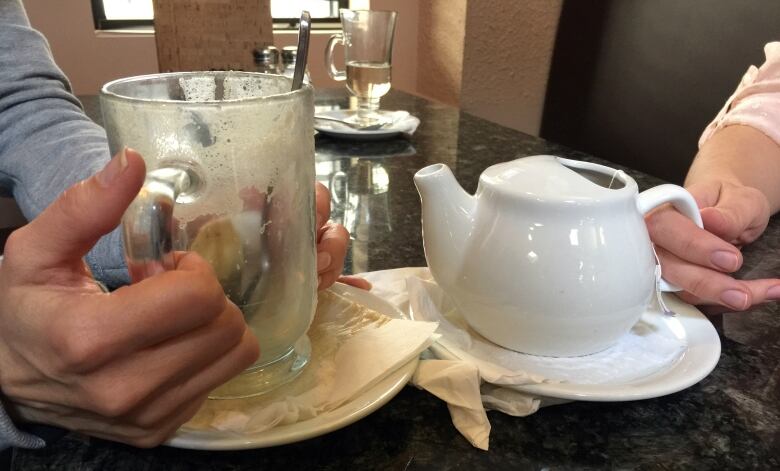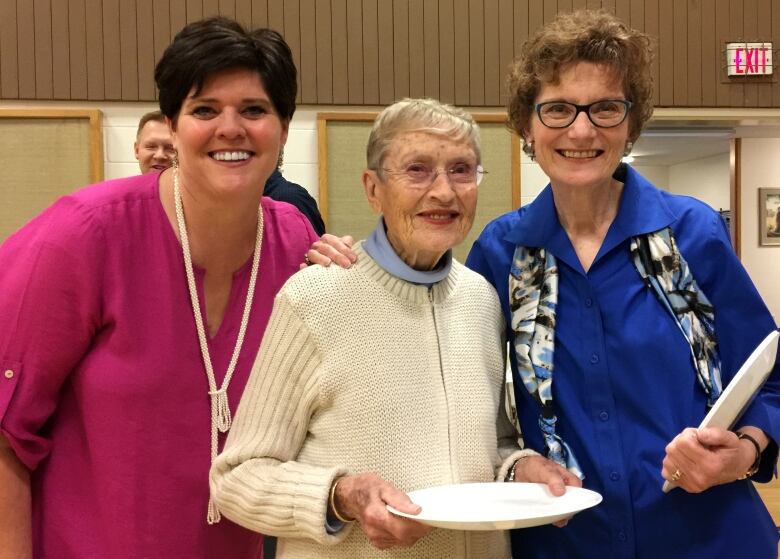'I'm not lost. If anything, I'm found': 3 Alberta women share experiences of leaving Mormon church
3 southern Albertans share their difficult journeys away from LDS church in new radio documentary

This story was originally published on May 16.
Tears rolldown Emily Rennie'sface as she recalls a church counsellor telling her she needed to give up her child for adoption because he was conceived out of wedlock oneof the most difficult moments that led to her ultimately leaving the Mormon faith that she had been raised in.
There are nearly 81,000 Mormons members of the Church of Jesus Christ of Latter-day Saints, also known as LDS in Alberta,with the largest concentrationin the southern part of the province, according to church records.
Those who choose to leave the church say it can be a lonely and isolating experience. That was certainly the case for Rennieandtwo other southern Alberta women profiled in a 30-minute documentary calledWhy I Leftthat airs May 16 on CBC Radio'sThe Doc Project.
"It was emotional and it was hard. But again, I would say it was no harder than sitting in church every week and feeling like I'm a hypocrite," said one of the other women, who is being called "Jane."
"I'm not lost. If anything, I'm found."
Emily's story
Rennie, now 28, was born and raised aMormon. She lived in Stirling a small agricultural, Mormon community of fewer than 1,000 people until she moved to Lethbridge for college.
It wasn't untilcollege that she even considered questioning her faith. Sheeventually decidedshe wanted to live outside the strict rules followed by practising Mormons.

"One of the first things I did when I decided to start making my own choices is I bought coloured underwear and coloured bras," Rennie said.
Wearing pink panties was a novelty forRenniebecause typically members of the LDS church wear a special kind of underwear known as "garments,"which are similar tocotton T-shirts and shorts and considered sacred.
Being told that I can't raise my child as my own because I don't have a ring on my fingerabsolutely just brought everything to the surface -EmilyRennie
"The guilt probably started in the store, choosing it out,"Renniesaid. "And it just took a lot of strength to remind myself that I am who I am and I need to allow myself to be who I am. And if that means wearing polka-dot pink underwear, then I need to give it a shot."
Then, while in her early 20s, she became pregnant out of wedlock.
"I think one of the biggest changing moments in my life was when I sat in the LDSfamily services building with a counsellor. Obviously it was her job to encourage me to give my child up for adoption," Rennie said.
"She started talking about the process with which it would go and how I could help pick a family or notBeing told that I can't raise my child as my own because I don't have a ring on my fingerabsolutely just brought everything to the surface for me," she said.
Rennie opted to keep her son, Nash, who just celebrated his seventh birthday.The issue created a wedge between her and the church that she could never reconcile, she said.
Sheformally left the church about a year and a half ago.
Jane andMichelle
Unlike Rennie, the two other women in the documentary didn't cite any one moment as the reason for their rifts from the church, instead describing a gradual drifting away.
The women spoke to the CBC on condition that their identities not be revealed because they still live amid the community, so they'll be called "Jane" and "Michelle."
I didn't have to come home from [church] and feel judged and feel lacking or just feel a bit empty- Michelle
Jane and Michelle are friends, now both in their 40s, whomet in the churchbut chose to leave independently of each other.
Jane grew up a Mormon and didn't question church doctrine until her kids challenged her over things likeLGBTQissues and gender equality.
Michelle, on the other hand, was 19 when shejoined the church. She said she doesn't regret the time she spent there, but eventually decided it was no longer the right place for her.

"I was able to recognize the differencewhen I wasn't going, that I didn't have to come home from [church] and feel judged and feel lacking or just feel a bit empty, even," Michelle said.
Michellehas anumberofchildrenwhoare still involved in the churchand thinks to a certain extent they are ashamed ofher decision to leave.
Both women said they came to havea number of concerns about things, including the church's view of issues like homosexuality. Same-sex attraction is permitted, but acting on it is considered sinful.
Jane also recalls the discussion around transgender washroom access in schools being particularly contentious in the Mormon community.

"It just turned into, 'Our religious values are being attacked, we are persecuted.' And this made an already uncomfortable decade for me as a person sitting in church every Sunday hearing things I didn't agree with it started to bring everything to the surface," Jane said.
We're loved and cherished in the Mormon church so long as you are the subservient, home-making [wife].- Jane
Michelle took issue with what she felt was aconstant pressure to be perfect, to take on more responsibility in thechurch and live up to certain standards that she felt she never felt she measured up to.
Jane and Michele also both said they felt women in the church were treated as second-class citizenssince they're unable to hold the priesthoodand, they felt,generally discouraged from pursuing full-time employment and a post-secondary education.
"We're loved and cherished in the Mormon church so long as you are the subservient, home-making [wife]. 'I only work because I have to, or as a backup in case something happens to my husband.' That is really the way that it's set up," Jane said.
She says shespent years in a marriage with a partner whose actions "bordered on abusive, but certainly unstable" in part because she was counselled to do so by church leaders.
'I do not feel like we're treated as second-class citizens'
Many women within the LDS communityin southern Albertadisagree with some of these criticisms.
Sherry Smith is one of them. She lives inthe "Mormon Mecca," as the LDS website calls the city of Lethbridge. There are more than a dozen congregations in Lethbridge alone.

Smith isthe president of the East LethbridgeMormon women's groupthe Relief Society, which focuses on service within the community, from food hampers to sponsoring refugees.
As women in the LDS church, I feel like we're very busy. We as mothers, we are busy raising families. Some of us have full-time jobs within the LDS community.- Sherry Smith, president of theRelief Society
"I do not feel like we're treated as second-class citizens or lesser than the men," Smith said.
"As women in the LDS church, I feel like we're very busy. We as mothers, we are busy raising families. Some of us have full-time jobs within the LDS community," she added.
When it comes to many of the other concerns raised by Jane, Michelle and Emily, she says the church'sfocus is always on loving one another but there are certain rules, obligations and expectations set out formembers of the church.
"If two men or two women were to marry that is something that we can respect from a legal perspective, but we can't embrace from a religious perspective," saidCameron MacLennan, who is a lawyer in Lethbridge by trade, but also acts as a president within the church's executive.
Both MacLennan and Smith say they know a number of people within the church who "have same-sex attraction" but choose not to act on it. So long as they don't, there is no sin according to church doctrine, MacLennansaid.
Both MacLennan and Smith also said the LDS church does not have formal doctrine that says parents who have children out of wedlock must put them up for adoption.
However, MacLennanadded that he's not trying to "vilify or challenge" the women.
"I want them to sense or feel thatI'm sorry this has happened. And if there's members of the church whocan address that, we're happy to try to do that."
'A huge price to pay'
Jane says she knows other people whoare questioning the beliefs of the church but are too afraid to leave.
"These people risk losing their friends and their family and all of the connections that they have in the communityby stepping away from the church. I mean that's a huge price to pay, a huge price to pay."
I still have many friends that are part of the faith and I respect their decisions- Michelle
All three women say they've lost LDSfriends because of their decision to leave the church.
However,they've had friends who have reached out with their support.
"I still have many friends that are part of the faith and I respect their decisions and I respect their viewpoints," said Michelle.
"I feel that the church gave me a lot of beauty and it gave me purpose for almost two decades."












_(720p).jpg)


 OFFICIAL HD MUSIC VIDEO.jpg)
.jpg)



























































































